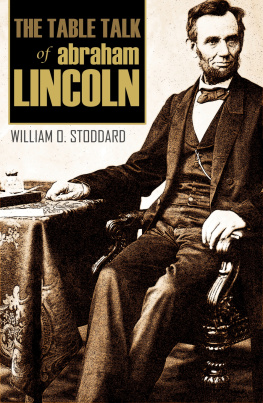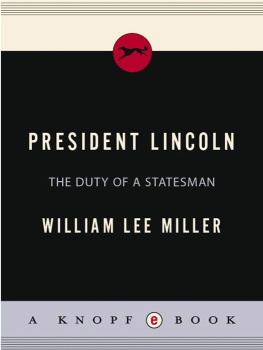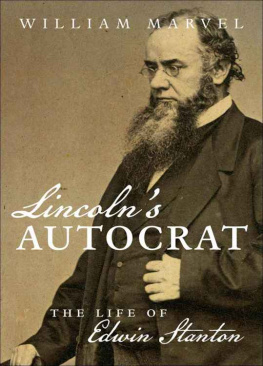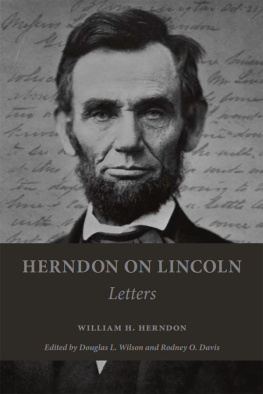List of Illustrations and Maps
All illustrations are courtesy of the Library of Congress except as noted below. Present-day photographs are by the author.
BEGINNING PAGE
South Carolinians firing on the Star of the West
The steamer Marion leaving Charleston
Cartoon lampooning the Crittenden Compromise
Cassius Clays battalion at the White House
Charles P. Stone with his daughter
Senator Edward Dickinson Baker
Lincoln and Buchanan entering the Senate
Lincolns first inauguration
Caricature of Winfield Scott as a bulldog
Lincoln confronting a secessionist
Secretary of State William H. Seward
Secretary of War Simon Cameron
Alexandria, Virginia, viewed from Maryland
The Marshall House in Alexandria
The 71st New York at rest in Alexandria
Ellsworths funeral in the White House
BEGINNING PAGE
New Jersey soldiers digging entrenchments
Hayfields, John Merrymans plantation
President Lincoln and General Scott reviewing regiments
Major General Irvin McDowell
Pierre Gustave Toutant Beauregard
Mutinous Garibaldi Guards surrendering
Officers and men of the 1st Rhode Island, spring of 1861
The 8th New York Militia at Arlington, June, 1861
Planning the advance to Manassas
Major General Robert Patterson
Ambrose Burnsides brigade at Bull Run
The remains of the Cub Run bridge
Major General Sterling Price
Major General George B. McClellan
Colonel Frank Blair of the 1st Missouri Volunteers
Captain Nathaniel Lyon
Lyons success at Boonville
Colonel Franz Sigel at Carthage
John C. Frmont in 1861
Company H, 3rd Arkansas (General Sweenys Museum, Republic, Missouri)
BEGINNING PAGE
Slaves escaping to Fort Monroe
The ransacking of a newspaper office in Bridgeport, Connecticut (Bridgeport Public Library Historical Collections)
The cover of Harpers Weekly, September 7, 1861
First Lieutenant Nathan G. Evans (South Caroliniana Library, University of South Carolina, Columbia)
Eppa Hunton, commander of the 8th Virginia (Gil Barrett Collection, U.S. Army Military History Institute, Carlisle, Pennsylvania)
A picket post along the Potomac, early October
Union troops at Fairfax Court House, October 18
The farmhouse on Harrisons Island
Lock 25, at Edwardss Ferry, on the Chesapeake & Ohio Canal
Henry Harrisons house in Leesburg
Margaret Jacksons house, Balls Bluff
George Washington Balls manse, Springwood
The Potomac between Harrisons Island and Balls Bluff
Skirmishing at Edwardss Ferry on October 22 and the retreat on the night of October 23
A modern view of the scene of the October 23 retreat
Vigilant pickets on the Potomac after Balls Bluff
Body of a Balls Bluff casualty dragged from the Potomac
Union soldiers celebrating McClellans promotion in front of his home
Senator Zachariah Chandler of Michigan
MAPS
Theater of War, 1861
Maryland and Northern Virginia
Bull Run Campaign
Missouri and Wilsons Creek
Leesburg and Poolesville
Balls Bluff
Preface
The accepted role of the historian is to explain what happened, rather than to guess what might have been, but the most intently objective historical studies sometimes adopt an unintentionally narrow perspective through a reluctance to address alternatives available to the participants. Historians unwilling to consider the conditional past tend to present historical developments as the only possible results of immutable chains of events. In professional circles the examination of alternatives is associated with futile, lowbrow speculation, and indeed the genre of counterfactual history often descends to ludicrous levels of political science fiction. Nonetheless, the refusal to weigh actions and events against some measure other than what they actually wrought leaves the historian functioning too much like an annalist and too little like an analyst.
In the study of the American Civil War that trend is exacerbated by the near-unanimous agreement that the conflict yielded the most desirable results, and the principal beneficiary of that phenomenon has been Abraham Lincoln. Credited with winning a war that ended slavery and reestablished the boundaries of the original United States, Lincoln is generally portrayed as having accomplished all that he set out to doand often as having done so with commendable genius. Even the incisive historian T. Harry Williams ameliorated his token admission that Lincoln sometimes... made bad mistakes by offering abundantly sympathetic explanation, and Williams ignored the most serious gaffes of 1861.his death he remains the one major figure in Civil War history whose popular image has escaped substantial revision by mainstream historians.
That collective generosity is not difficult to understand, especially in light of the deathblow that Lincolns war dealt to slavery. In offhand remarks at Independence Hall, on his way to Washington, the president-elect hinted ambiguously at his hope for ultimate equality of opportunity for all men, butif his overt contemporary statements on the subject can be believedthe chance to strike a blow at slavery did not motivate him in the least to begin the war. Even if it had, any citizen of average intellect and contemporary values who could have foreseen the dreadful cost should have questioned why that end could not have been achieved less destructively. Had Lincoln himself known how much blood and treasure his war would ultimately consume, it seems certain that he would not have pursued it for the sole purpose of emancipating the countrys slaves, if he had pursued it at all.
The preservation of the Union remained Lincolns principal focus throughout the entire first year of the conflict, and at his inauguration he stood willing to consign the nations four million slaves and all their descendants to perpetual servitude to maintain that union. For him, as for millions of other Americans, the United States formed the white mans foremost bastion of democracy and libertytwo concepts that popular thought had come to blend promiscuously. Lincoln represented those who did not differentiate between the landmass over which the Constitution held authority and the constitutional principles that protected democracy and liberty. He viewed his sworn duty to preserve, protect, and defend the Constitution as a responsibility to retain all the unwilling members of that union by force, if necessary, and he insisted on doing so even if it meant arbitrarily reinterpreting or blatantly violating the Constitution he had sworn to defend. In arrogating such extraordinary authority to the executive branch, he created precedents that permanently jeopardized the liberty the Constitution promised to all Americans, and most of those precedents predated any hope that they would be offset by the freedom his actions would incidentally provide for the enslaved minority.








